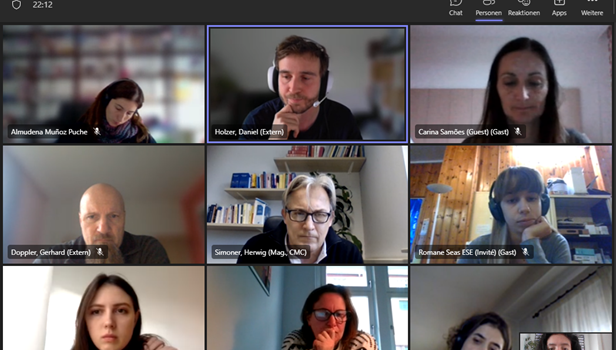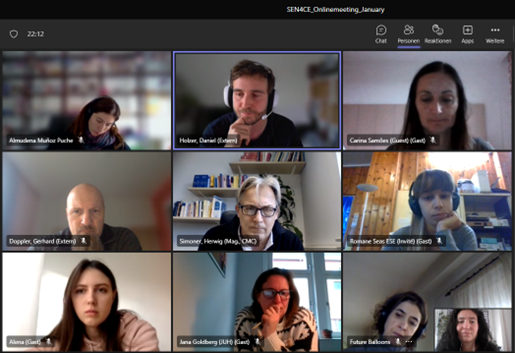
Dear all,
We hope this newsletter finds you well and you enjoyed your Christmas break together with your loved ones! The Erasmus+ project SEN4CE has steadily progressed since the publication of the last newsletter!
Result 1 – CE for seniors and life-long learning
After our kick-off meeting in Graz, we started conducting the needs analysis of result 1 – CE for seniors and life-long learning. To develop a custom-tailored training course on circular economy for seniors, closing gaps of existing approaches and creating synergies with other projects, the SEN4CE partners conducted a needs analysis to assess the knowledge and behavioral habits of its target group in the partner countries. In addition to what was planned in the project application, we conducted a survey asking seniors, what they already know about circular economy, what they would be interested in and where there are still gaps in their knowledge. All in all, we obtained 52 responses from the 5 partner countries. Thanks to every single person who took part in our survey, your support means a lot to us!
To sum up, the needs analysis conducted in the SEN4CE partner countries demonstrated that our senior respondents, representing different age and gender groups and education levels, are familiar with the concept of circular economy and apply some of the circular economy practices, but are still sometimes uncertain and need more adequate information to embrace it in their day-to-day life.
These results suggest that while designing the SEN4CE curriculum, we will focus on:
– Explaining the importance of circular economy practices and their impact on the environment;
– Extending the consideration of the impact of production when buying products outside of household appliances and food (such as clothes, furniture, games and leisure etc.);
– Transforming or reusing products in other ways as well as buying secondhand products (knowledge of platforms & tools);
– Using low or non-polluting means of transport;
– Providing insight on how using circular economy practices can create a sense of community and continue to build a positive sense of environmental contribution;
– Finding ways to tackle the barrier of perpetually changing information on the best practices for a more circular economy;
– Providing the trust-worthy resources to ensure that adequate information remains accessible and accessible for people.
After that, all partners collected best practice examples from their respective countries, searching for programs or companies, that support achieving the goals given above, e.g. training and educational programs on circular economy for seniors, applied at the national and international levels. Each project partner collected two to three examples of circular economy initiatives available in their country and one international one, making a total of 19 good practices. The summary of the survey and our best practice research can be found on our project website! Right now, we are finishing the detailed concept development and will soon conduct expert workshops and start with developing the e-learning course!
R2 – CE for care and retirement sector
In contrast to R1, R2 does not deal directly with the group of seniors, but with the care and retirement staff. Given the demographic development outlined in R1, the care and retirement sector will become increasingly important. Yet, companies and organizations providing related services are rarely targeted by adult education. Also, seniors who are in retirement/care contexts rarely have access to high quality adult education. To reach these seniors, in R2 we will develop a training course for companies and organizations providing services in the retirement and care sector, training them on circular economy topics and also “training them to train” their clients. Circular economy can also connect seniors with the young generation.
During our research for best practices with this goal in mind, we found that there are many gaps in what is available now. During the online research, it became apparent that there are still significant gaps in the field of senior education in a care and retirement context as such and specifically on the topic of circular economy. The best practices found therefore often don’t have a direct link to CE but are best practices in adult education for seniors/train-the-trainer programs in general or at least linked to environmental issues. This shows once more the importance of our project, and we are very happy to close this gap and provide a e-learning course which closes this gap. Here we will also continue with the development of the curriculum and detailed concept of the e-learning materials before we go on with the implementation into Articulate.
Monthly meetings
In addition to the individual research and work, the SEN4CE consortium meets once a month to discuss the progress of the project and to plan subsequent steps. So many motivated faces! 😊

If you want to be always up to date about the project progress, please visit our website or Facebook page regularly to be always updated! https://sen4ce.eu/
We are looking for you! Are you interested in the upcoming program. Get in touch with us for upcoming workshops and/or events! The program is for free!
If you want to support us by spreading the message of the Sen4CE project, please share our website on social media! There is a lot to come, stay tuned and follow our channels!